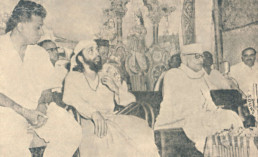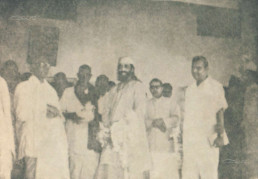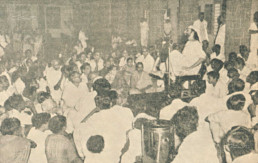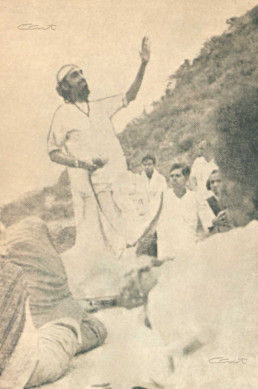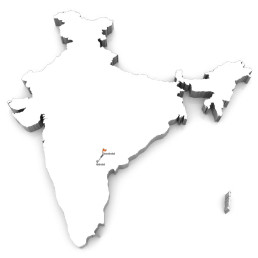
Jnana Yajna 71

Year & Dates:
July 13, 1960 to August 03, 1960

Yajna Topic:
Shrimad Bhagavad Gita- Chapter 13

Place:
Secunderabad, India.
The story of the 71st Jnana Yajna began with a happy rickshaw ride for Pujya Gurudev. Though He was scheduled to arrive on July 12, 1960, a day before the inauguration of the yajna, He took a flight on July 11th to Hyderabad’s Begumpet airport to avoid delay due to a central government workers’ strike. The airport staff were surprised to see Pujya Gurudev step out alone with no huge welcoming crowd around him. But Pujya Gurudev nonchalantly traveled by the shuttle out of the airport and then enjoyed a quiet rickshaw ride to the Anasuya Villa where He would usually stay. He even went to Secunderbad that evening to inspect the yajnashala, utterly surprising the organizers. Not stopping with that, on July 12th morning, He affectionately went back to the same airport to enable the planned traditional Purna Kumbha welcome and bring joy to the gathered crowds! That sweet prelude is just one example of how Pujya Gurudev was untouched by the fanfare around Him.
At Ease and Always Inspiring
The 71st Jnana Yajna held at Keyes High School started with a stirring welcome by Sri Ramesh Chandra Chowdri and an inaugural address by Sri Kaleshwar Rao, Speaker of the Andhra Pradesh Assembly. Urging the audience to think about intellectual evolution which included scriptural knowledge, Pujya Gurudev pointed out: “We are now in the scientific age. We want to know the scientific basis of every object. Yet the scientific age says we do not want religion. That is not a scientific approach.” His evening discourses on the 13th chapter of Gita was a thorough analysis of what constituted the field of experiences and who the Knower of the field was. In the morning sessions from July 18th, Kenopanishad drew hundreds of seekers; Pujya Gurudev completed His discourses on that contemplative text and then continued teaching until August 3rd about the significance of Om and the different personality layers that veil Consciousness.
On July 30th, 450 devotees boarded 9 buses and three cars with disciplined eagerness for the spiritual yatra to Nagarjuna Sagar, about 3 hours away from Secunderabad. Even before the yajna’s inauguration, Pujya Gurudev had visited Nagarjunasagar with the Raja of Muktyala. It was a place of scientific progress, natural beauty, and cultural worth. At the scenic site, a new dam across the perennial river Krishna was being constructed to become the world’s largest masonry dam, and the Nagarjuna Konda in the middle of Nagarjuna Sagar which had ancient Buddhist excavations was a thought-provoking venue.
The late night satsang, the early kirtans, and the Avabhrta Snaana in the bathing ghats near the ruins of an ancient Shiva temple refreshed the spiritual aspirations of all. The marvel of the architectural carvings of Lord Buddha, the wonder of the learning that happened in that ancient university of Nagarjuna, and the bliss of a midday satsanga with Pujya Gurudev under a neem tree – the devotees returned with memories to uphold for a lifetime.
When the 71st Jnana Yajna concluded on August 4th, along with the sacred sprinkles of the Ganga waters, each seeker received the yajna prasad booklet – “Vedanta, a bird’s eye view,” indicating how Pujya Gurudev wanted to equip all with a higher perspective.
Photo Gallery
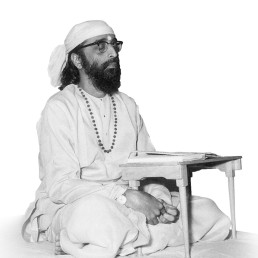
“Think,” Says Pujya Gurudev
This realization of the Self in its pure nature, undressed of all its matter envelopments, is the final goal of spiritual seeking, and there is more than one path prescribed for this Divine achievement. Integration of a human personality must start from the point where an individual finds himself to be. No education can be successful unless the students are given graded lessons.
A totally disintegrated individual must also be given a path that he can easily follow with us restless equipment. Spiritual unfoldment cannot take place merely because of an intellectual appreciation of the theory of perfection. Evolution can actually take place only when a corresponding change in the very subjective life is accomplished. Therefore, an active, intelligent and enthusiastic participation of the seeker in controlling, directing and re-educating his own thought-life is necessary. Hence the difficulty in accomplishing the inward spiritual unfoldment in every individual.
The great scientists of the past, discovering ways of evolving the entire mankind constituted of different types, had evolved various parallel roads all leading to the same goal. Each path is the fittest for the one who is walking in it. No path can be said to be a nobler one than the others. In a Medical shop there are different medicines; and each one serves a definite type of patient, and the medicine prescribed for a given disease is the fittest medicine for that patient so long as he continues in his present ailment.
From Tyagi Magazine
Rewire the way you Think!
Our sense of happiness or unhappiness is a result of the quality of thoughts in the mind, shaping our ego. Like sunlight reflecting in water, our self-perception fluctuates with the state of our thoughts, but our true nature as pure consciousness remains unchanged. Recognizing this empowers us to transcend the fluctuations of joy and sorrow, mastering our experiences.
